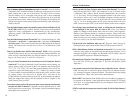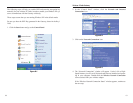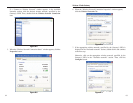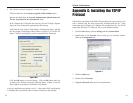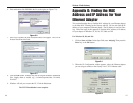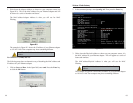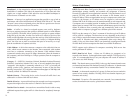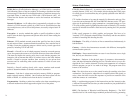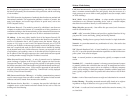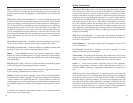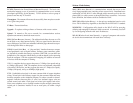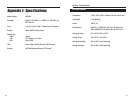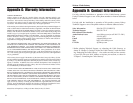
LAN (local area network) - A group of computers and associated devices that
share a common communications line and typically share the resources of a
single processor or server within a small geographic area (for example, within
an office building).
MAC (Media Access Control) Address - A unique number assigned by the
manufacturer to any Ethernet networking device, such as a network adapter,
that allows the network to identify it at the hardware level.
Mbps (Megabits per second) - One million bits per second; unit of measure-
ment for data transmission.
mIRC - mIRC runs under Windows and provides a graphical interface for log-
ging onto IRC servers and listing, joining and leaving channels.
Multicasting - Sending data to a group of nodes instead of a single destination.
Network - A system that transmits any combination of voice, video and/or data
between users.
NIC (Network Interface Card) - A board installed in a computer system, usu-
ally a PC, to provide network communication capabilities to and from that com-
puter system. Also called an adapter.
Node - A network junction or connection point, typically a computer or work
station.
Notebook (PC) - A notebook computer is a battery-powered personal comput-
er generally smaller than a briefcase that can easily be transported and conve-
niently used in temporary spaces such as on airplanes, in libraries, temporary
offices, and at meetings. A notebook computer, sometimes called a laptop com-
puter, typically weighs less than five pounds and is three inches or less in thick-
ness.
Packet - A unit of data routed between an origin and a destination in a network.
Packet Filtering - Discarding unwanted network traffic based on its originat-
ing address or range of addresses or its type (e-mail, file transfer, etc.).
PC Card - A credit-card sized removable module that contains memory, I/O,
or a hard disk.
77
Wireless-G Cable Gateway
76
the development and application of electrotechnology and allied sciences for
the benefit of humanity, the advancement of the profession, and the well-being
of our members."
The IEEE fosters the development of standards that often become national and
international standards. The organization publishes a number of journals, has
many local chapters, and several large societies in special areas, such as the
IEEE Computer Society.
IP (Internet Protocol) - The method or protocol by which data is sent from one
computer to another on the Internet. It is a standard set of rules, procedures, or
conventions relating to the format and timing of data transmission between two
computers that they must accept and use to be able to understand each other.
IP Address - In the most widely installed level of the Internet Protocol (IP)
today, an IP address is a 32-binary digit number that identifies each sender or
receiver of information that is sent in packet across the Internet. When you
request an H
TM
L page or send e-mail, the Internet Protocol part of TCP/IP
includes your IP address in the message (actually, in each of the packets if more
than one is required) and sends it to the IP address that is obtained by looking
up the domain name in the Uniform Resource Locator you requested or in the
e-mail address you're sending a note to. At the other end, the recipient can see
the IP address of the Web page requestor or the e-mail sender and can respond
by sending another message using the IP address it received.
IPSec (Internet Protocol Security) - A suite of protocols used to implement
secure exchange of packets at the IP layer. IPSec supports two basic modes:
Transport and Tunnel. Transport encrypts the payload of each packet, leaving
the header untouched, while Tunnel mode encrypts both the header and the pay-
load and is therefore more secure. IPSec must be supported on both transmit-
ter and receiver and must share a public key. Tunnel mode is widely deployed
in VPNs (Virtual Private Networks).
IPX (Internetwork Packet EXchange) - A NetWare communications protocol
used to route messages from one node to another. IPX packets include network
addresses and can be routed from one network to another.
ISP (Internet Service Provider) - A company that provides individuals and
companies access to the Internet and other related services such as Web site
building and virtual hosting.



